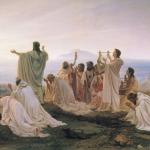I have, for sometime now, wondered whence this ‘new school’ came that promotes ‘theological exegesis’. It interests me because some of my favorite NT scholars (Joel Green, Beverly Gaventa, Richard Hays, M. Bockmuehl; M.J. Gorman) endorse this agenda (now represented by a journal – the Journal of Theological Intepretation). But, what is ‘theological exegesis’? I actually had an opportunity to ask one of the above mentioned scholars about this and he said that it was not a very concrete discipline with clear parameters and tools. I was happy, then, to get something quotable from an article I stumbled upon. These are the words of Stephen Fowl
‘The practice of interpreting scripture theologically is determined by the purposes for which Christians are called to read and embody scripture. Theological interpretation of the Bible is not determined by any particular method but by the goal of growing into ever deeper communion with the triune God and with others. This means that as Christians and Christian communities struggle to interpret and embody scripture in the contexts in which they live, they will be judged successful to the extent that they faithfully live and worship before God’ (‘Knowing your Context’, Interpretation 2002: 45).
I think this new school of theological exegetes stems from a concern that NT scholarship has lost its steam -enter Bockmuehl’s Seeing the Word. As this school grows in size and influence, more pressure will be put on commentary writers to answer tough questions about modern application and modern contextualizing of the scriptural message. This is already seen in the Two Horizons commentary series, though I don’t quite feel like the ‘commentary’ portion is that different than other series’ such as Pillar or NICNT; consider the thoroughgoing theological exegesis of Gordon Fee regardless of what series he is writing for! Truly a ‘scholar on fire’ (a term used in the FS for him ed. by Soderlund and Wright). I am happy with the contributions of those who promote ‘theological exegesis’, but I am still waiting for a bit more clarity on its manner of approach before I see it as ‘the way forward’. I am happy, though, that such scholars in this camp hail from places such as Princeton, Yale, Durham (England), and Oxford. It, perhaps, has never been easier to be an evangelical hoping to find a voice in the larger dialog. I am particularly fortune to be at Durham where we have at least three scholars involved in ‘theological exegesis’ – Francis Watson, Walter Moberly, and Stephen Barton (my supervisor). They certainly do not agree on everything. But, one gets a sense that at our weekly NT seminar, it is because of people like these that the Q & A is not just about the ancient world. Is it coincidence that many (if not all) of those who are in the ‘theological exegesis’ camp are also heavily invested in issues of New Testament morality and modern gender, political, ecological, and sexual ethics? I think not.











